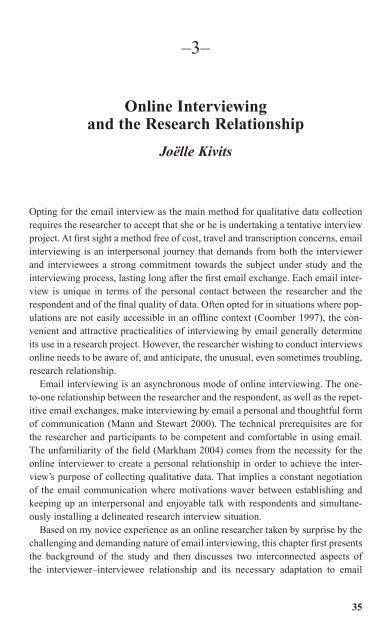Virtual Methods
Virtual Methods
Virtual Methods
You also want an ePaper? Increase the reach of your titles
YUMPU automatically turns print PDFs into web optimized ePapers that Google loves.
–3–<br />
Online Interviewing<br />
and the Research Relationship<br />
Joëlle Kivits<br />
Opting for the email interview as the main method for qualitative data collection<br />
requires the researcher to accept that she or he is undertaking a tentative interview<br />
project. At first sight a method free of cost, travel and transcription concerns, email<br />
interviewing is an interpersonal journey that demands from both the interviewer<br />
and interviewees a strong commitment towards the subject under study and the<br />
interviewing process, lasting long after the first email exchange. Each email interview<br />
is unique in terms of the personal contact between the researcher and the<br />
respondent and of the final quality of data. Often opted for in situations where populations<br />
are not easily accessible in an offline context (Coomber 1997), the convenient<br />
and attractive practicalities of interviewing by email generally determine<br />
its use in a research project. However, the researcher wishing to conduct interviews<br />
online needs to be aware of, and anticipate, the unusual, even sometimes troubling,<br />
research relationship.<br />
Email interviewing is an asynchronous mode of online interviewing. The oneto-one<br />
relationship between the researcher and the respondent, as well as the repetitive<br />
email exchanges, make interviewing by email a personal and thoughtful form<br />
of communication (Mann and Stewart 2000). The technical prerequisites are for<br />
the researcher and participants to be competent and comfortable in using email.<br />
The unfamiliarity of the field (Markham 2004) comes from the necessity for the<br />
online interviewer to create a personal relationship in order to achieve the interview’s<br />
purpose of collecting qualitative data. That implies a constant negotiation<br />
of the email communication where motivations waver between establishing and<br />
keeping up an interpersonal and enjoyable talk with respondents and simultaneously<br />
installing a delineated research interview situation.<br />
Based on my novice experience as an online researcher taken by surprise by the<br />
challenging and demanding nature of email interviewing, this chapter first presents<br />
the background of the study and then discusses two interconnected aspects of<br />
the interviewer–interviewee relationship and its necessary adaptation to email<br />
35



